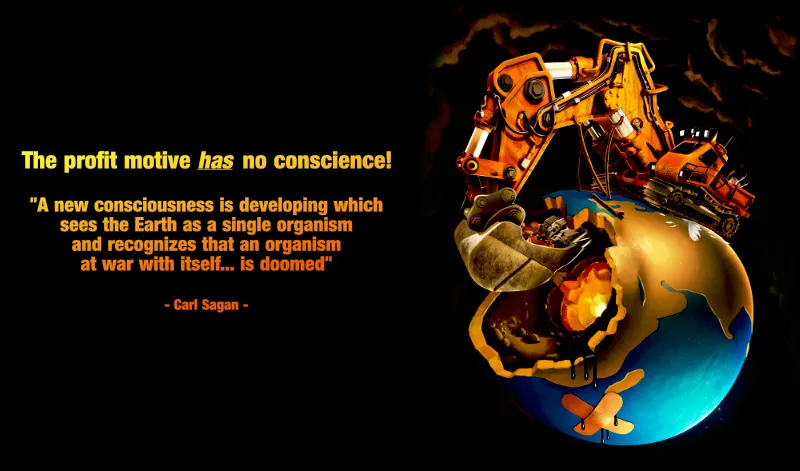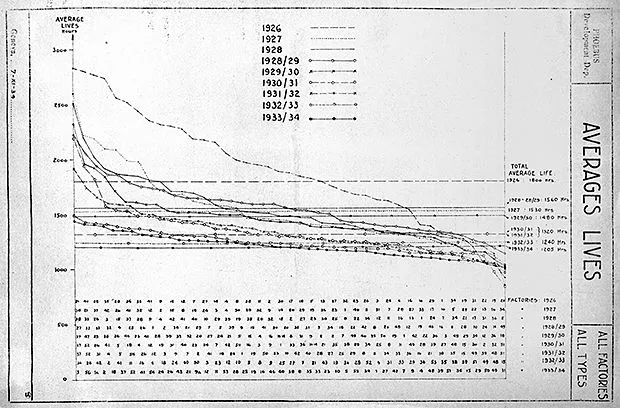Let's dive further into the seldom mentioned aspects of our economic system, exploring its fundamental mechanisms.
This is a continuation of part 1 of this series

Proper disposal = loss of profit
In addition to the wasteful practices we have already explored, the profit motive often forbids the proper disposal of waste altogether. It's a simple calculation really, especially if you keep in mind that morals don't pay the rent. If a company can save one million dollars by dumping waste somewhere instead of disposing it properly... why wouldn't they do it? Because it hurts the environment?
Well that's cute, but these people make decisions for thousands, sometimes hundreds of thousands of employees and stakeholders. What do you think the workers and company investors would say if they were asked: Do you want to keep your job and get paid or do you want us to note some big losses, fire a portion of our employees and calculate lower salaries for all remaining ones because of the million dollar cleanup we had to invest in to save some trees in far-off Ecuador?

One does not need to be immoral to opt for the more profitable option here. It's quite self-evident in large corporations because the bottom line affects everything the corporation does and decides upon.
People's fear of losing their position in the company will serve nicely for most to justify dumping toxic waste into a river instead of shipping it to a proper disposal installation at the company's expense.
And no, I'm not exaggerating. This is not a fictional scenario or theoretical notion. It happens all the time, sometimes with publicity - most of the time without any. And no these are not all "accidents" - this happens quite deliberately time and time again. A prime example would be Texaco (now Chevron), dumping toxic waste in the Amazon to name but one example.
Here's Abby Martins detailed report on this malicious state of affairs. In my opinion, Martin remains one of the most trustworthy journalists of our times.
It's also plainly visible that the farther away from our home these things occur, the less likely it is that these issues would be solved in a nature- and people-friendly way. After all, dumping toxic waste in Times Square would get a lot of people upset and be difficult to hide, which might harm the company's bottom line more than investing in expensive and proper disposal.
Most tribes in the Amazon do not have lawyers to sue the company, nor reporters or influential representatives within our "democratic" structure in the west to make a fuss when thousands of people die as a result of a Western company dumping toxic material in their rivers.
If you have a good PR department (and all large corporations do) it's a simple calculation:
Some people's bad fortune nobody will hear or care about vs. several million dollars of expenses in exchange for no tangible advantage to the company.
Cost and profit determine every decision, so why would the outcome be any different? As I said, morals do not pay the rent and the shareholders. Profit does.
We can complain and protest it all we want, we can call our representatives and write heated blogs about these crimes... But at the end of the day the company is forced to act in money-saving ways - much like everyone else in the economy - merely by being part of a system that rewards cheating, trickery and unsustainability.

Let's make it so they'll break it
Unfortunately the drive to produce waste does not stop there. The nature of cyclical consumption dictates that sales be made continuously regardless of utility, as we already explored.
Imagine you were head of development in a company and you were tasked with finding out how to further increase the company's bottom line. Easy - sell more! But how are we going to do that if our market is filled up already? Innovations could make a new niche yes, but they also require heavy investment up front. Which we don't want to do if we want to increase profits in the near future.
How about instead of innovating we make it so that products break more easily? No, seriously!
If people cannot use their products for 20 years they will be forced to rebuy the same items before then, and might stick with our company because we have a great PR department and such a cool logo.
While this may sound outright devious when one first hears the idea, it is common practice in product creation today. Economists call this phenomenon "planned obsolescence", which really says it all. The result is an unimaginable volume of waste, often due to the malfunction of a single minor component.

Planned obsolescence can come through the purposeful utilization of cheap materials that wear out quickly (using cheap alloys for screws and bolts instead of stainless steel for example).
Or placing the processor in a location inside the laptop chassis where it will constantly run a little hotter than technically necessary. These measures will speed up the rate of material failure and a polished public image will serve as distraction from the fact that several previous purchases of the same products have stopped working after a relatively short amount of time.
Many cases also exist where products would regularly break mere weeks or months after the legally guaranteed warranty period has expired. Convenient!
Do you really think that is a coincidence? With all the know-how, computer analysis tools and technical understanding of our current age these products' lifespans can be calculated and estimated quite concretely from the prototype onward - long before the product is ever sold in a store.
Take lightbulbs for example. The life expectancy of an average lightbulb is about 1000 hours today, nevermind the fact that there have been countless inventions to increase their lifespan dramatically and successfully. It's not that nobody would like to buy lightbulbs that last... it's just that somehow, they're not available. A great documentary that goes into detail on the issue of planned obsolescence was made by ARTE, and details several other examples of intentional material failure that occur on a daily basis - worldwide - with all sorts of products we all use.
In case you are interested, there is a quite notorious lightbulb which never made it to market that has been burning for more than a century since its construction in 1895.
If lightbulbs like that were made for everyone on the market, how many lightbulbs do you think could be sold in the next 2 years, after everyone has outfitted their home with these 100-year-lightbulbs? Do you see how an efficient product like this would literally kill its own market longterm? How many lightbulbs would be sold ten years down the road?
Hardly any.
Introducing efficiency like this would be a self-imposed blow to the electronics industry's bottom line. And why on Earth would they voluntarily kill demand for their inefficient product line if it pays their employees' bills?
You can see how this would even increase the company's motivation to engineer a lower life span, on purpose. Here's a great article on this subject I came across.

We gamble the Earth's resources away so people can continue to buy lightbulbs of abysmal quality. Every. Year.
It's the exact same thing with printers, car tires, shoes, lighters, headphones... the list is endless.
And these are only a few examples. Planned obsolescence exists in virtually every industry today... Can you imagine how much actual material and resources humanity could save if we opted for products that last, instead of producing products that perpetuate the cyclical consumption our system depends on?
One might also consider future generations and their own need for Earth's resources to be intact and to not have been plundered for monetary gain by earlier short-sighted generations.
All of it comes down to a simple calculation today - how do we get the most amount of profit in the long term? The answer: If we make products that only live short term. And while we're at it we'll constantly polish our perceived value in the public eye.
One doesn't have to be a genius to figure out that this systemic wasting of resources cannot be upheld forever without consequences for humanity and all life on Earth. Garbage dumps are only the first sign, eventually it will become harder and harder to mine these finite resources, and we will be left with a planet that we have raped to pay imaginary bills, born from the same mechanism of scarcity and lack that motivates companies to plunder everything longterm.

If we put it soberly:
If we made products that last, we would save ample resources that could be used for other projects.
A much more economic decision.
Intentionally holding back
Planned obsolescence is only part of the story unfortunately. The other side is the deliberate holding back of innovation and advances in technology for the sake of profit.
Which may sound counterintuitive at first... Aren't innovative features ultimately why new products are sold? Yes and no. While it is true that people want constantly better computers, phones and so on, we can also witness that the rate at which these increases of technical capability happen are minute, sometimes superficial or even nonexistent.
Why wouldn't a company put all their innovations and upgrades together into the next phone? Wouldn't that make the phone the market leader because everybody wanted it?
Well maybe it would if anybody could afford it, but consider this: If Apple made the perfect iPhone that people wanted, with the iPhone 3... How would they ever be able to sell an iPhone 4 the next year? Let alone an iPhone13 a decade down the road.
Get it?

If I innovated on the spot like a madman and created the perfect phone with 150 hours of battery life, the perfect operating system, a universal audio jack and all the features you would ever want in a phone, a sane society would value my contribution because the product I offer is so much further ahead of the pack.
But in the "economy" we live in, this awesome product I invented is highly dangerous for my own business future if I want to profit in the long term, because people would not become my returning customers - they would be one time customers only. And my competitors will do their best as well to kill my invention and stifle its public exposure, long before it ever reaches the market.
There is a direct motivation to keep advances and innovations from being released all too quickly, so that more generations of the same low quality product can be pumped out in the meantime, with changes that are hardly significant and just enough to motivate my mindless company fans to keep coming back for no good reason other than to have "the new generation" of whatever it is I'm selling.
I feel this has become even worse in recent years.
More and more companies are caught downgrading their newest product generations' features in comparison to earlier versions while talking about superficial "amazing" upgrades that are supposed to attract new customers.
If you don't believe me you may explain in the comments why Apple decided to downgrade their recent iphone's audio features. People got mad because the audio jack had been taken away with the iphone 7, now requiring you to buy a proprietary converter separately, to still be able to charge your phone and listen to music at the same time.
I can totally recommend Computing Forever's forceful product review.
It really has gotten that bad!
This was not necessary in earlier iPhone versions, and pretty much anyone who has ever used a phone to listen to music can appreciate that a phone has an audio jack AND a power charging plug. Not merely one or the other. And I'm sure someone at Apple (one of the largest and succesful corporations in the world) would have noticed, before the phone was released ;)
Don't forget that these sorts of "inefficiencies" also have the convenient side effect of requiring you to buy all sorts of "proprietary" EXTRA ITEMS exclusively from that company, just to get the functionality back that earlier phones offered all by themselves.

So instead of getting the basic customer needs fulfilled, we are told how amazing the new display is, how shiny the casing, how awesome the built-in camera... But for that we get an overpriced phone that is not even capable of the bare minimum we have gotten used to over the years. And this is not a knock on Apple, all companies do this in one way or another. And why wouldn't they if it works?
Only a braindead consumer would go along with such an "upgrade" to keep supporting the manufacturer. But Apple's continued success is proof that people are religiously in love with the company, and even workers jumping off of Foxxcon's roof is not enough to destroy what apple's PR department has carefully crafted. Much like with many others who pump out worse and worse versions of their earlier products while still enjoying high prestige somehow.
Symbolic of our system's inefficiency-obsession, it is much cheaper to install suicide nets than to pay higher salaries. Naturally ;)

Microsoft comes to mind as well. People still talk about Windows XP with nostalgia in their eyes after having been through their first week of Windows Vista or Windows 8 pulling their hair out because of Microsoft's "upgrades" and "improvements" that not a single longtime windows user I have spoken to feels comfortable with.
The downgrading of the number of cylinders in car engines is another great example.
Not long ago people could commonly buy V8 and V6 cylinder driven cars, which are getting really scarce today for the average consumer. Today it is claimed that these are "bad for the environment" but many critics of this recent development have pointed out that engines running with less cylinders require the motor to run hotter and the materials to wear out faster.
If your goal is to conserve high quality building materials and creating an engine that will not break down quickly, it would be smarter to build enduring motors that last, instead of cutting corners deliberately for some profit-driven inclination, with the aim to ensure that the cars need to visit the repair shop sooner than it would be necessary.
V8 was a symbol for quality not long ago.
Today most people consider these cars unnecessarily large and redundant despite their technical advantages in the long term from a purely economical standpoint. It's not that these changes are forced upon us, they are slowly introduced and reintroduced to us until we demand them, often for the wrong reasons.

Maintaining problems instead of solving them
As you can see, there is ample profit-motive to service and maintain existing problems instead of solving them. A solved problem is a dead market.
What do I mean by that?
An easy example is the health industry - or rather the sickness industry. They don't earn their money from people being healthy but from people being sick. Now think about that for a moment...
We can see that the health industry can only thrive when there are enough sick people to go around for the amount of doctors and hospitals we have available.
Crazy huh? You don't hear that ever in political debates...
But any industry depends on there being a problem that isn't quite solved, ever.
Now imagine someone came up with a way to cure cancer for good, just like that. Would it be hailed as a major breakthrough and adopted by the whole industry? In a sane world: OF COURSE it would!
In our world: HELL NO! Do you want to destroy the entire industry or what?!

The reason?
I'm sure you guessed it already - because nobody could sell chemotherapy to sick patients anymore if they were all cured tomorrow. Not only that, but if people were actually cured through a relatively simple method then huge amounts of profit would go down the drain for all other industries connected to the chemo-industry. Talk about a chain-reaction ;)
Chemotherapy rarely heals cancer patients, but it can be beneficial in keeping the patient alive for a few more months in pain and agony, in which further costly "maintaining" of the cancer can take place - anything that can be sold to desperate families while never quite ending the dependancy on the medical industry, or curing the disease for good.
A cured patient is no longer a patient, and therefore a financial loss for the industry concerned.
You can apply this problem to any sector of our tangible economy: Cars need to break down regularly or mechanics would be out of work. Pipes need to break, so the plumber can fix them. Roofs need to be reshingled so it doesn't rain into the house.
We have gotten to a point where the very structure of our economy does not allow for innovations that are fundamental, because any fundamental innovation automatically threatens huge established sectors of the economy.
It's a systemic deadlock. Most people are pursuing their careers because of the salary, not because they love the job.

We see these service industries as "normal", but if we consider the technological capabilities we have today, these issues are completely avoidable and wholly unnecessary.
The other main reason we keep these products to such a low quality standard that requires constant fixing is that any product has to remain affordable to be sold at all, because money is a scarce commodity for most people, systemically. A roof that never leaks would technically be possible to build, but too expensive to buy for most people in a profit driven system.
Instead, due to their low production quality these products have to wear out quickly so that a new (equally low quality) fix for the problem can be offered in a perpetual neverending cycle of selling and breaking, selling and breaking, selling and breaking.
Our language gives the show away as well: The word "cheap" describes not merely a really affordable price of something, but signifies low quality and short life span.
A profit driven system has little interest in solving problems fundamentally, instead it tries to maintain them in the most elaborate and costly way possible, involving as many other companies and institutions in the process as it can, and then selling it all to us as '"the way it is". So everybody can have "a job".
Am I the only one who finds this utterly insane? Do you see how freakin' backwards that is? Every little kid would not understand that logic at all.

It's only "grown-ups" who constantly defend this insane concept because of their conditioning.
Everything is backwards
If you recognize the problem and dare to apply this train of thought to the whole world economy...
You can surely see how these patterns of behavior are not only hostile to humanity as a whole and to our children's future, but also counterproductive to lifting ourselves up out of this wasteful mess we are in.
We're all sitting in the same boat and nobody really wins if we keep on avoiding these issues at their root cause. The doctor may get his income through big pharma, but what is he going to do when his parents need an actual cancer treatment that could save their life? At that point it would most likely be too late for them as no solution is readily available, at least officially, and he will have no frame of reference to even consider there might be an actual cure already - outside of his pharma-industry warranted selection of poisons.
It's not like these problems haven't been solved! It's just that advertising a solution to a problem will greatly hurt the industry in the long term, so cures are shushed and barred off with patents and secrecy. This ultimately is the reason why institutions like the DEA and CDC exist at all - to officially forbid this plant or that treatment in the name of progress and health when it is one of those things that could save many lives.
Anyone who has dug a bit will laugh at the proposition that "Cannabis has no medicinal value and should therefore be placed in the same category as heroin." But people are put in jail for it everyday, while it's totally alright to spray chemical poison on our fields and fruits.

These insitutions exist to tell us what we ought to believe and how we ought to see the world to fit nicely into the profit scheme. Don't.
Always use your own discernment and question everything.
Be certain that whenever you are told there is no cure to a disease or a solution to a problem... it has most likely been solved decades ago, and the documents hide away in some patent office drawer or rural engineering shack under a blanket of silence and threats.
A superb example for this is the breakthrough invention of two Swiss scientists from the late 1980s. They found a way to make agriculture highly efficient, without the need for petro-chemicals, pesticides and Monsanto poisons. Now guess what happened to that invention...
That's right. It disappeared.
In all likelihood you have never even heard about CIBA GEIGY or the mechanism of infusing seeds with abundant primordial qualities through the simple use of an electro-static field.
So I dubbed the report for your consideration into English. These things need to get out into public consciousness.
Check the mindblowing report here:

This concludes part two of this series.
Your comments and rebuttals are more than welcome. I am always willing to change my mind if I come across a good case that answers these objections among the others yet to come.
In all my years since picking up this information however, I simply have not heard a good case against these points, only against the solution proposed by TZM that we have yet to cover in future parts. I welcome you to be the first to argue for the profit mechanism in light of all its ramifications we have already explored.
tzmvirginia.files.wordpress.com
unsplash.com
unsplash.com
unsplash.com
spectrum.ieee.org
unsplash.com
unsplash.com
unsplash.com
unsplash.com
unsplash.com
unsplash.com
unsplash.com
unsplash.com
unsplash.com
Thanks for stopping by <3



